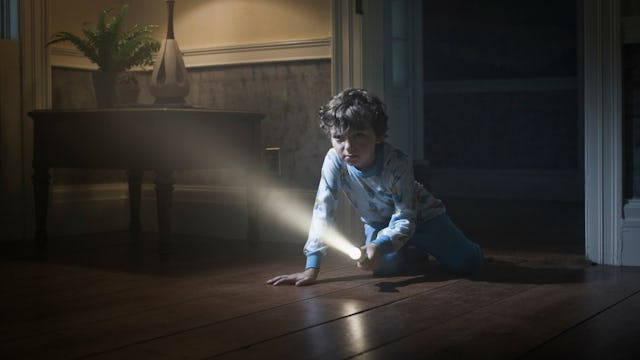Helping Older Kids Deal With Their Fears

“Mommy! I’m scared!”
I can’t count how many times I’ve awoken to this midnight cry from each of my three children. I expected it when they were little, but my youngest two are 13 and 9, and it’s still not unusual for them to wake me up because they’ve either had a bad dream or totally freaked themselves out in the middle of the night.
My kids have wonderful, rich imaginations, which is a quality I love in them. But along with awesome creativity, that imagination also leads to a lot of scary thoughts. Tack on a family history of anxiety, and it seems that my offspring are hardwired for irrational fear.
And honestly, that’s been one of the hardest things for me to handle as a parent.
I use reason and logic to address my own fears, but by definition an irrational fear isn’t appeased by reason and logic. My kids’ fears don’t make sense to my developed brain, and my solutions don’t make sense to their still-developing brains. Kids haven’t learned yet that they are actually in charge of their imaginary boogeymen—they just feel afraid.
Most of the time, my kids’ fears come from an inability to control their thoughts. “I’m thinking about something scary,” is the standard explanation when I ask them what they’re afraid of. That makes it really difficult to help them.
It’s easier when they’re afraid of something imaginary, but specific. If there’s a monster in their room, I can turn on all the lights and prove he doesn’t exist, or I can hand them a spray bottle of “Monster Potion” that they can shoot at anything they “see” in their room. But when they’re afraid of something inside their own head, all I can do is try to get in there with them.
But they often can’t describe what they’re imagining in words. I’ll suggest they think about a happy place or imagine their best day, but they’ll insist that they can’t. I’ll try to sing a song or a prayer or tell them a story, but they’ll say it doesn’t really help.
I hate not having the words to help them feel safe. The only thing that seems to help is to have me or my husband physically present. But we can’t always be there, and over time they do need to learn how to manage their fears without me as a crutch.
My mama bear instinct is to tell them I’ll protect them because it hurts my heart to see them scared. But ultimately, I want to help them find their courage.
That sounds so simple on paper.
But late at night, when everything feels weird and everyone’s brains aren’t fully functioning properly, it feels impossible. When I’m super tired I sometimes lose my patience and start spewing, “There’s nothing to be afraid of! We’re in our safe, warm house! Daddy and I are ten steps away! Just close your eyes and go to sleep!”
Sometimes tough love is in order, but it doesn’t feel right when I’m dealing with a scared kid. I have no problem laying down the law when it comes to bedtime shenanigans—asking for water, farting around, etc.—but when they cry out, “I’m scared!” their fear is real. I hear it in their voices. I see it on their faces. They’re in a panic and need help keeping fear at bay.
We do what we can during the day. We don’t watch horror movies. We limit the amount of scary images they’re exposed to. I hear about kids who love to read Goosebumps or other scary books, and I think my kids would rather die. I wish I knew what it was that made some kids love that stuff and others freak out.
But my kids are also scared by the most random things sometimes. One of them loved Harry Potter, but got totally freaked out by a benign VeggieTales video. There’s just no telling what’s going to trigger their fears, and there’s no sure fire way to quell them.
Flashlights help some. Leaving the bathroom light on helps some. Letting them listen to audiobooks to fall asleep helps some, unless there’s a creepy part in the story. But nothing helps 100%.
Thankfully, we have an older teen who went through years of nighttime fear and is fine now. She sleeps in her own room on a different level of the house and we never hear from her in the night anymore. So I have hope for our other two.
But it takes time to learn to slay your own monsters and face down your own demons. The best we can do is be patient with our kids and give them the skills and encouragement they need to conquer their fear—gradually and eventually.